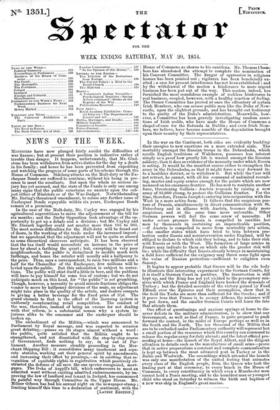In the war on the Continent, both sides are evidently
buckling their energies to new exertions on a more extended scale. The mortality amongst the Russian troops in the Dobrudscha, which recalls English traditions of Wakheren, possesses less interest simply as a proof how greatly life is wasted amongst the Russian soldiery, than it does as evidence of the necessity under which Russia is acting. It would be the manifest course either to strengthen the army in the Dobrudscha, so that it might force a way forward in- to a healthier district, or to withdraw it. But while the Czar will not retract, he cannot, with all his command of unlimited recruit- ing, muster and equip armies enough for the points which are now menaced on his enormous frontier. He has now to maintain another force, threatening Gallicia : Austria responds by raising a new army of 95,000 strong, to protect the Gallician frontier. For the time, therefore, Francis Joseph is entering into cooperation with the West in a more active form. It follows that the suspicious pos- ture of Prussia, simultaneously in direct communication with St. Petersburg and in alliance with Austria, becomes daily more suspicious, and at the same time more untenable. Other German powers will feel the same screw of necessity. If under severe pressure Russia is compelled to sacrifice her men by thousands in sustaining an impracticable position, —if Austria is compelled to move from neutrality into action, —the smaller states which have tried to trim between pro- tection under Russia and nonintervention under England, will be obliged to declare to which side they belong, and to take their risk with Russia or with the West. The formation of large armies in France may indicate to them on which side the greater risk will lie ; while the difficulty that Russia already betrays in maintaining a field force sufficient for the exigency may throw some light upon the value of Russian protection—sufficient to enlighten even Saxony. It begins to appear probable that Greece will be the vile body to illustrate this interesting experiment to the German Courts, for i it is itself a German Court n partibus. The insurrection is still kept up, and the King has not yet yielded to the peremptory mis- sives with which France and England have backed the demands of Turkey ; but the detailed accounts of the victory gained Ly Fuad Effendi over the Epirotes and their accomplices, show that in the field the Turks are more than sufficient for the Greeks ; and if it prove true that France is to occupy Athens, the nuisance will be put down, and the smaller German Courts will learn the fate that attends them.
One effect of questionings and anxious spyings at home to dis- cover defects in the military administration, is to show that our Government, as well as that of France, is quite prepared to push forward the contest, in the midst of Europe perhaps as well as in the South and the North. The ten thousand of the Militia that are to be embodied under Parliamentary authority will represent but a small portion of the resources which this country can command to release the regular army for duty abroad ; and the latest official pro- ceeding at home—the launch of the Royal Albert, and the diligent attention to details such as the manufacture of small arms—prove that in active preparations a constant and complete communication is kept up between the most advanced p3st in Turkey or in the Baltic and Woolwich. The assemblage which attended the launch was only one manifestation of the united feeling that animates every class of the English people, from the Queen who took the leading part at that ceremony, to every bench in the House of Commons, to every constituency in which even a Manchester man cannot hold a Peace meeting, and to the humblest man or youngest child who stood on Saturday to witness the birth and baptism of a new war-ship in England's great marine.


























